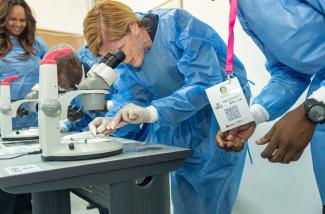Democracy, Human Rights, and Governance
All of our activities, including those that improve the delivery of health care and expand economic growth, promote government transparency and accountability. We improve budgeting and planning, supervision, information, procurement, and other intra-governmental systems that can strengthen service delivery, and support the electoral process and civil society engagement.
Economic Growth and Trade
We increase literacy and entrepreneurship skills by improving the quality of instruction for adults and youth. In addition, we bring U.S. volunteers to Angola to train farmers and agri-businesses in crop production, processing, and marketing.
Global Health
Angola was one of the first three countries selected to participate in the President’s Malaria Initiative. Since 2011, the mortality rate for children under five years of age has fallen by 23 percent. Through a partnership with the Government, and with the support of the U.S. President’s Emergency Plan for AIDS Relief, we strengthen efforts to curb the spread and to mitigate the impact of HIV/AIDS. Our programs also improve the quality of reproductive health programs, combat tuberculosis, and eradicate polio.
Environmental Activities
USAID, in partnership with the U.S. Forest Service, is supporting biodiversity conservation and natural resource management in Angola. Through the ECCO activity, USAID aims to help communities in the upper Cubango-Okavango region balance conservation and prosperity, protecting essential resources while enhancing well-being.
Working in Crisis and Conflict
The country regularly experiences drought, flooding, and food insecurity. A lack of access to safe drinking water and basic health care services contributes to increased morbidity and mortality rates. Our response strategy in Southern Africa includes investing in disaster risk reduction programs that build regional, national, and local level capacities and supporting the integration of ongoing disaster response capacity-building programs to eliminate gaps and strengthen response networks in the region.

